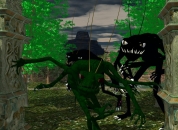Government
Government
The Houses:
…are based off of the old Celtic clan system with regional provinces (which in the case of Caladharas are 5 in number: Erech, Dorrance, Pirogin, Greendale and Owl Point). These provinces are known individually as Coicidh’s (In the old tongue, which translates to “province”). Capitals of the provinces are typically chosen as the largest city, or the city with the best access to trade routes (In the Caladharas case, this is Erech.)
Citizens of the House are considered to be members of a Tuath (or tribe, Tuatha Dé Caladharas is the formal term for one such)
In ancient times, each House consisted generally of:
- “native men”
- “broken men.”
The “native men” were those who were related to the Taioseach, and to each other by blood ties. The members of the House were related to the Taioseach and principal heads of the House and in this consanguinity all were bound together in a common interest. The House also contained septs or branches composed of clansmen who had become powerful or prominent in some way, many times through marriage and founded families almost as important as that of the Chief. They chose to join a clan for mutual interests and protection.
The “broken men” (people whose blood ties to the House are either broken or non existent) were individuals or groups from other House who had sought and obtained the protection of the clan. In ancient times this often would have been caused by their own House having suffered terrible losses in warfare, leaving them a small group, these broken men ask to become part of the clan and most always were accepted if they were deemed to be of good integrity.
In modern days, “broken men” are people (Commoners) who have simply applied for (and been inducted to the House), or people who have left their House because they have not approved of the actions/directions of their leaders. In addition, terms “native” and “broken” have more meaning depending on how egalitarian the House is.
The House organization is made up of the Taioseach, the Tanist, the Chieftains, and the general body of the House. The Taioseach dispersed the law in times of peace (in modern times, some provincial areas have formed an impartial judiciary who is responsible for seeing that the laws are enforced), and led them in war (War was usually engaged in only with the consent of the Chieftains of the House). However, once the decision to wage war had been made, the old laws applied: The Taioseach may not be challenged during a time of war.
The Tanist was the person next in succession to the Taioseach according to the laws of House, his special duty was to hold the House lands in trust for the House and their posterity. In the absence of the Taioseach he commanded the whole House. Tanist is usually a hereditary position. On the death/incapacitation/prolonged absence of the Taioseach he would assume permanent control of the House and a new Tanist would be named by hereditary lines, or acclaim of the Taioseach and Chieftains.
The Chieftains are now held to be the heads of special sections/or branches within the House, and administer certain areas or necessary departments within the whole.
To compare this with the United States, the Houses could be considered to be the Federal Government with the same duties and overall responsibilities in many areas.
The Council
The Mortauth Council, or House Council is a moderating body that consists of members of all the Houses, and is intended to moderate and arbitrate disputes over territory and policy. Similar in many ways to the League of Nations that was formed after the Treaty of Versailles.
Municipitality Governments
Municipitality Governments handle the day to day operation of services such as garbage collection, public utilities, parks and gardens, roads, streets, bridges, libraries, swimming pools and a range of family and community services within the regional provinces.Each regional province has an single elected Governor, a Lt. Governor, an 11 member provincial senate, and Investigative/Law Enforcement Agency that handles matters that threaten the public safety/peace.
Each City within a provinces has a Mayor and town council that oversees local government responsibilities on a local level.
To compare this with the US, the Municipitality Government is the equivalent of State/Local governing bodies.
The Enemy Collaboration Act
Instituted after the House Wars, it allows a Municipitality or Province to seize the assets of any member of the citizenry who has been determined to have been working to destabilize, or overthrow the government. The amount of property that is seized is typically limited to what would be needed to make restitution for property, and citizenry that were harmed by the activity. In addition, the act also allows Municipitalities and Provinces to oversee or restrict any and all trade between their citizens, and their enemies in times of war.
The Hospitality Accords:

Discussion ¬